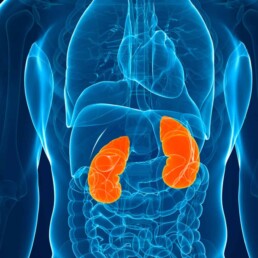Chronic kidney disease (CKD) is a progressive condition characterized by the gradual loss of kidney function. While the direct impact on the kidneys is well-documented, the interplay between CKD and gut health is less commonly discussed. One crucial aspect of this relationship is the uremic dysbiosis cycle, a harmful feedback loop that exacerbates both kidney disease and gut imbalance. In this blog, we will delve into the intricacies of the uremic dysbiosis cycle, exploring how it impacts CKD and potential strategies to mitigate its effects.
The Uremic Dysbiosis Cycle
By Majd Isreb, MD, FACP, FASN, IFMCP
What is Uremic Dysbiosis?
Uremic dysbiosis refers to the imbalance of gut microbiota in individuals with CKD or end-stage renal disease (ESRD). In healthy individuals, the gut microbiota plays a crucial role in maintaining overall health, including digestion, immune function, and metabolic processes. However, in CKD, the impaired kidneys lead to the accumulation of uremic toxins in the blood, which can significantly disrupt the gut microbiota’s balance.
The Uremic Dysbiosis Cycle Explained
The uremic dysbiosis cycle is a vicious cycle where dysbiosis and CKD perpetuate and exacerbate each other. Here’s a detailed breakdown of the cycle:
1. CKD and Uremic Toxins
In CKD, the kidneys lose their ability to effectively filter waste products from the blood. This results in the accumulation of gut-derived uremic toxins, such as indoxyl sulfate and p-cresyl sulfate. These toxins are harmful not only to the kidneys but also to the gut environment. You can read about these uremic toxins in details in this blog.
Join us to end the kidney disease epidemic
2. Disruption of Gut Microbiota
The presence of uremic toxins disrupts the gut microbiota, leading to dysbiosis. Beneficial bacteria, such as Bifidobacteria and Lactobacilli, decrease in number, while pathogenic bacteria proliferate. This imbalance can affect various bodily functions, including nutrient absorption and immune response.
3. Decreased Production of Short-Chain Fatty Acids (SCFAs)
A healthy gut microbiota produces SCFAs, such as butyrate, which have anti-inflammatory properties and help maintain the integrity of the gut barrier. Dysbiosis leads to a decrease in SCFA production, weakening the gut barrier.
4. Increased Intestinal Permeability
With reduced SCFAs, the gut barrier becomes compromised, resulting in increased intestinal permeability, often referred to as “leaky gut.” This condition allows endotoxins and other harmful substances to pass from the gut into the bloodstream.
5. Systemic Inflammation
The translocation of endotoxins into the bloodstream triggers a systemic inflammatory response. Chronic inflammation is a hallmark of CKD and contributes to its progression by further damaging the kidneys. In addition, elevated gut microbial metabolite such as trimethylamine N-oxide (TMAO) levels significantly correlated with an increased risk of developing chronic kidney disease (CKD) and accelerated decline in glomerular filtration rate (eGFR). In fact, this study showed that effects of TMAO on kidney function decline were so profound, that it was comparable to known CKD risk factors such as diabetes and hypertension.
6. Worsening of CKD
The inflammation and additional kidney damage caused by increased intestinal permeability and endotoxins perpetuate the cycle, worsening CKD. As kidney function continues to decline, the accumulation of uremic toxins increases, further disrupting the gut microbiota.
Breaking the Uremic Dysbiosis Cycle
Addressing the uremic dysbiosis cycle requires a multifaceted approach targeting both gut health and kidney function. A comprehensive gut restoration protocol is vital in this approach. Here are some potential strategies:
Dietary Interventions
Diet plays a crucial role in managing CKD and gut health. Incorporating fiber-rich foods can promote the growth of beneficial gut bacteria and increase SCFA production. Additionally, reducing the intake of foods that contribute to toxin accumulation can alleviate some of the stress on the kidneys.
Probiotics, Prebiotics and Postbiotics
Probiotics, which are live beneficial bacteria, and prebiotics, which are compounds that promote the growth of beneficial bacteria, can help restore gut balance. Probiotic supplements or foods like yogurt and kefir, along with prebiotic-rich foods such as garlic, onions, and bananas, can support a healthier gut microbiota. Postbiotics that provides SCFA can also be beneficial.
Medications and Supplements
Certain medications and supplements may help reduce uremic toxins and inflammation. For instance, oral adsorbents can bind to toxins in the gut and prevent their absorption into the bloodstream. Omega-3 fatty acids and anti-inflammatory supplements may also be beneficial in reducing systemic inflammation.
Regular Monitoring and Medical Support
Regular monitoring of kidney function and gut health is essential for individuals with CKD. Working closely with an Integrative or Functional medicine trained healthcare providers to adjust treatment plans based on the progression of the disease and gut health status can help manage the uremic dysbiosis cycle more effectively.
The Bottom Line on The Uremic Dysbiosis Cycle
The uremic dysbiosis cycle is a complex interplay between gut health and kidney disease, each exacerbating the other in a harmful feedback loop. Understanding this cycle is crucial for developing effective interventions that can break the cycle and improve the quality of life for individuals with CKD. By focusing on dietary changes, probiotics, prebiotics, and medical support, it is possible to mitigate the effects of uremic dysbiosis and support both gut and kidney health.
Breaking the uremic dysbiosis cycle requires a comprehensive approach, but with the right strategies, individuals with CKD can achieve better health outcomes and improve their overall well-being.
By staying informed and proactive, we can safeguard our kidney health. Join us!









